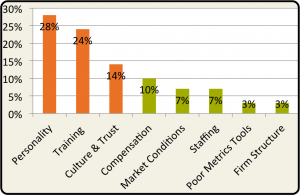Posted In: Business Development
Overcoming Lawyer Business Development Fears
It’s time for Halloween. Have you ever been scared? I mean, bone-chilling terrified? The kind of fear that actually changes your body heat and causes you to quiver?
 Fear is a primal instinct. It’s the emotion designed to keep us alive. If we survive a bad experience, fear reminds us to avoid it in the future. Some of our most vivid memories are born in fear. Adrenaline etches them into our brains. Our first reaction is always to flee from fear to our comfort zone.
Fear is a primal instinct. It’s the emotion designed to keep us alive. If we survive a bad experience, fear reminds us to avoid it in the future. Some of our most vivid memories are born in fear. Adrenaline etches them into our brains. Our first reaction is always to flee from fear to our comfort zone.
In our “train the trainer” workshops, we teach marketing and business development directors and managers how to coach lawyers. In addition to coaching basics, we train around lawyer personality and how to leverage it to motivate lawyers to sell. One element of that workshop is the concept of a lawyer’s fears.
In our sessions with lawyers, we ask people to identify obstacles—factors that prevent them from performing business development activities. You can probably guess that the most common obstacle for most lawyers is the lack of time. But once you get past the issue of time, most of the obstacles identified have to do with lawyers’ personalities and fears about engaging in business development.
We recently took a survey drawing from mid-sized regional firms across the country asking people to identify primary obstacles for attorneys at their firms.
These are the results:
As you can see, compensation plans and firm structure take a back seat to factors like “It’s not me,” “I’m uncomfortable,” “I’m afraid of becoming too be pitchy,” “I’m afraid of losing friendships,” etc.
I’ve distilled the comments we get in our sessions and the recent research and identified four basic lawyer fears and simple strategies to help you deal with each.
- Fear of rejection
- Fear of failure
- Fear of interaction
- Fear of success
Fear of rejection
A lawyer’s fear of rejection is based in the concept of resilience. Resilience is defined by lawyer and psychologist Larry Richard as the ability to bounce back from criticism or rejection. The general public scores 50% on resilience tests; lawyers come in at 39%. (See Larry’s excellent post on this topic here.)When told “no, thank you,” we lawyers brood about it, question it, write a memo about it, etc. Salespeople, however, simply move on to the next opportunity.
To combat fear of rejection, help your lawyers to see that, in the sales process, rejection is not failure. Rejection is part of the process. Make it a foregone conclusion that, in the business development process, people are often going to say no. Remind your lawyers that business development is less about convincing someone to do what they aren’t predisposed to do and more about matching needs to capabilities. If there isn’t a match, it doesn’t mean you failed; often, it just means the opportunity wasn’t right.
Fear of failure
The movie Chariots of Fire tells the story of Harold Abrams, the 1924 Olympic champion in the 100 meters. During his training, he loses a race and enters a period of self-doubt. He complains to his girlfriend, “I don’t run to take beatings! I run to win! If I can’t win, I won’t run!” His wise girlfriend responds, “But Harold, if you don’t run, you can’t win.”
Lawyers generally are accustomed to doing well when they stick to the world they know. Trying to compete in an unfamiliar world like business development exposes them to failure so, like Harold, they try to avoid it.
Get your lawyers past their fear of failure by tying business development activities to the familiar. Help your lawyers to see that business development is already a part of the world they understand. Your lawyers already know how to prepare, spot issues, ask questions to uncover facts, analyze implications, and suggest solutions to problems. These are lawyering skills, but if you were to attend any sales training program, you’d find these are the same elements they teach salespeople to consider in approaching a prospective customer.
Another strategy to combat this fear is to help lawyers break down business activities into segmented, easily approached tasks. The whole concept can be daunting if attacked all at once. As Rick Chillot says (quoted in this post), “Stop looking at the grand scheme. Think only about each successive step. If you’re afraid of heights, don’t think about being on the fortieth floor of a building. Just think about getting your foot in the lobby.”
Fear of interaction
Below is a description of personality type we encounter often. Ask yourself if you have someone like this at your firm.
- Quiet, not very social
- Known as a good lawyer: works hard, creative legal solutions, methodical, reserved, organized
- Academic
- Believes doing good work ought to be enough
- Aloof about business development
- Reverts to details of work in social situations
- Has few contacts
Sound familiar? This is the classic social introvert. However, you may be interested in the other side of their personality. Introverts are very perceptive—question them after they have attended a meeting where they haven’t said a word and they will likely be able to tell you the hidden agenda of everyone in the room. They may not have many contacts, but the ones they have are deep, strong, and loyal.
People like this can actually be very successful at business development. If you have someone like this  at your firm (And I’d be surprised if you didn’t), start with their existing relationships. Make relationship building a strategic activity rather than just showing up at conferences with a stack of business cards. These people are probably better on boards and committees than in the networking room. Make sure they focus their writing and publishing activities on relationship building—not just publishing to create a prestigious line in their bios.
at your firm (And I’d be surprised if you didn’t), start with their existing relationships. Make relationship building a strategic activity rather than just showing up at conferences with a stack of business cards. These people are probably better on boards and committees than in the networking room. Make sure they focus their writing and publishing activities on relationship building—not just publishing to create a prestigious line in their bios.
Introverts love clearly defined goals and tasks. Give them checklists, and measure their success on tasks performed. It is easier to find activities that will work for them than it is to change them, so don’t coerce them into activities they’re not built for. There are plenty of activities to match every type.
Fear of success
One of my clients once told me, “Craig, my biggest fear is that I’ll do everything you tell me to do, and I’ll actually get more clients and won’t have the time to take care of them.”
This is real. It’s difficult to ask someone if they’d like a glass of water when they feel as if they have their lips sealed to an open fire hydrant. You may have to back up and address fundamental firm issues of capacity before you can address this fear. Capacity issues can make all the difference in motivation for business development activities. Click here for a brilliant post made last year on this topic by my favorite author.
Another element to the fear of success is aloofness. Often, lawyers don’t want to admit that they aspire to business development success. It’s seen as an admission that they aren’t good enough to get business on the merits of their work alone. This is more prevalent than you might think.
Aloofness, the attitude that business development is beneath me, is unprofessional. In addition, the thought I don’t really want to make partner is a sign of deeper fears about what it takes to succeed. Be on the lookout for it, and call it out.
Lawyer fears are real. Don’t just throw up your hands and conclude that there is nothing you can do about it. Taking lawyers as they are and making them better is what they hire us to do. Don’t be afraid yourself. Everyone can do a little better at business development. Be brave, take them by the hand, and lead them to a place of comfort and success.

No Comments